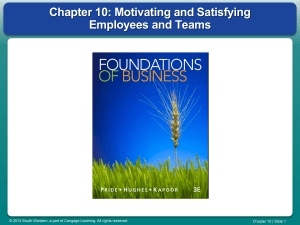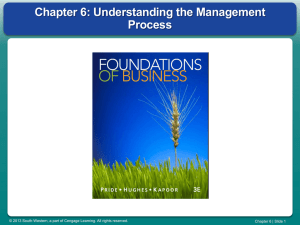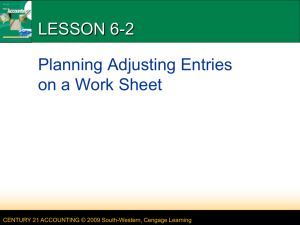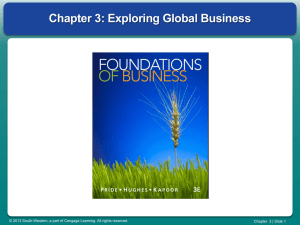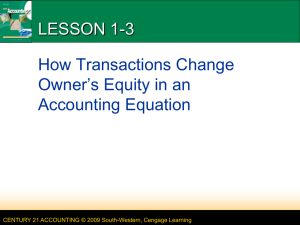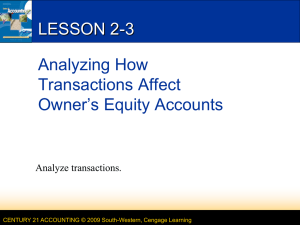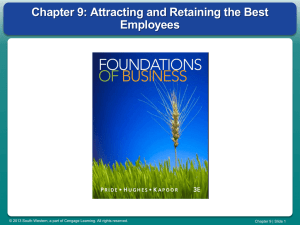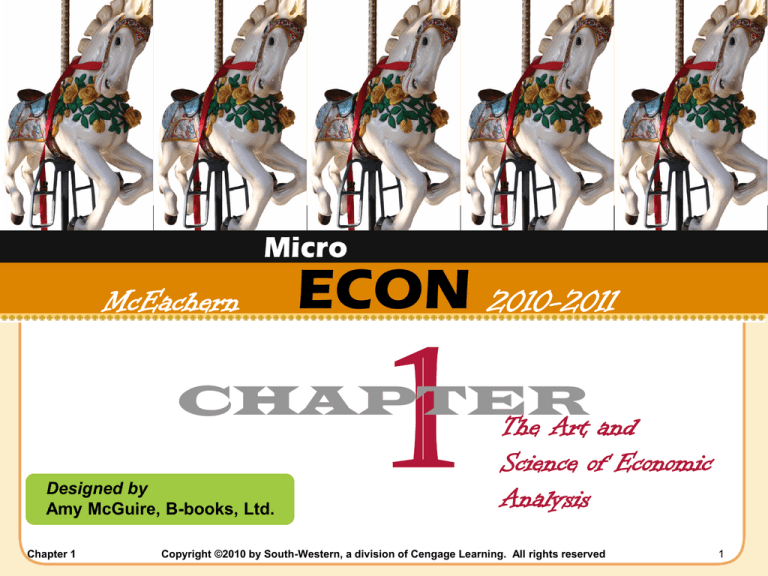
Micro
McEachern
ECON 2010-2011
1
CHAPTER
The Art and
Designed by
Amy McGuire, B-books, Ltd.
Chapter 1
Science of Economic
Analysis
Copyright ©2010 by South-Western, a division of Cengage Learning. All rights reserved
1
The Economic Problem
Wants, desires: unlimited
Resources: scarce
Economic choice
Economics
How people use scarce
resources to satisfy
unlimited wants
LO1
Chapter 1
Copyright ©2010 by South-Western, a division of Cengage Learning. All rights reserved
2
Resources
Inputs; factors of production
Used to produce goods and
services
Goods and services are scarce
because resources are scarce
1.
Labor
2.
Capital
3.
Natural Resources
4.
Entrepreneurial ability
LO1
Chapter 1
Copyright ©2010 by South-Western, a division of Cengage Learning. All rights reserved
3
Resources
Labor – human effort
Physical effort
Mental effort
Time
Payment: Wage
Capital – human creations
Physical capital
Human capital
Payment: Interest
LO1
Chapter 1
Copyright ©2010 by South-Western, a division of Cengage Learning. All rights reserved
4
Resources
Natural resources – Gifts of
nature
Renewable
Exhaustible
Payment: Rent
Entrepreneurial ability
Talent, idea
Risk of operation
Payment: Profit
LO1
Chapter 1
Copyright ©2010 by South-Western, a division of Cengage Learning. All rights reserved
5
Goods and Services
Good: see, feel, touch
Service: intangible
Scarce good/service
The amount people desire
exceeds the amount
available at zero price
Choice
Give up some goods and
services
LO1
Chapter 1
Copyright ©2010 by South-Western, a division of Cengage Learning. All rights reserved
6
Goods and Services
Bads
We want none of them;
not even at a zero price
Free goods and services
“There is no such thing as a
free lunch”
Involve a cost to
someone
LO1
Chapter 1
Copyright ©2010 by South-Western, a division of Cengage Learning. All rights reserved
7
Economic Decision Makers
Households
Consumers
Resource owners
LO1
Chapter 1
Demand goods and
services
Supply resources
Firms, Governments, Rest of
the World
Demand resources
Produce goods and
services
Copyright ©2010 by South-Western, a division of Cengage Learning. All rights reserved
8
Markets
Bring together buyers and sellers
Determine price and quantity
Product markets
Goods and services
Resource markets
Resources
LO1
Chapter 1
Copyright ©2010 by South-Western, a division of Cengage Learning. All rights reserved
9
A Simple Circular-Flow Model
Flow of
Resources
Products
Income
Revenue
LO1
Chapter 1
Among economic
decision makers
Interaction
Households
Firms
Copyright ©2010 by South-Western, a division of Cengage Learning. All rights reserved
10
Exhibit 1
LO1
Chapter 1
The Simple Circular-Flow Model
for Households and Firms
Households
- Supply resources to
resource market; earn
income
- Demand goods and
services from product
market; spend income
Firms
- Demand resources to
produce goods and
services; payment for
resources
- Supply goods and
services to product market;
earn revenue
Copyright ©2010 by South-Western, a division of Cengage Learning. All rights reserved
11
Rational Self-Interest
Individuals are rational
Make the best choice
Given the available information
Maximize expected benefit
With a given cost
Minimize expected cost
For a given benefit
The lower the personal cost of helping
others, the more help we offer
LO2
Chapter 1
Copyright ©2010 by South-Western, a division of Cengage Learning. All rights reserved
12
Choice Requires Time
and Information
Time and information – scarce;
valuable
Rational decision makers
Willing to pay for information
Improve choices
Acquire information
Additional benefit expected
exceeds the additional cost
LO2
Chapter 1
Copyright ©2010 by South-Western, a division of Cengage Learning. All rights reserved
13
Economic Analysis Is
Marginal Analysis
Expected marginal benefit
Expected marginal cost
Marginal
Incremental, additional, extra
Rational decision maker:
Change the status quo if expected
marginal benefit exceeds expected
marginal cost
LO2
Chapter 1
Copyright ©2010 by South-Western, a division of Cengage Learning. All rights reserved
14
Microeconomics and
Macroeconomics
Microeconomics
Individual economic choices
Markets coordinate the choices of
economic decision makers
Individual pieces of the puzzle
Macroeconomics
Performance of the economy as a
whole
Big picture
LO2
Chapter 1
Copyright ©2010 by South-Western, a division of Cengage Learning. All rights reserved
15
The Science of
Economic Analysis
Economic theory / model
Simplification of economic reality
Important elements of the problem
Make predictions about the real
word
Good theory
Guide
Sort, save, understand information
LO3
Chapter 1
Copyright ©2010 by South-Western, a division of Cengage Learning. All rights reserved
16
The Scientific Method
1. Identify the question and define
relevant variables
2. Specify assumptions
Other-things-constant
Behavioral assumptions
3. Formulate the hypothesis
Key variables relate to each other
4. Test the hypothesis - evidence
LO3
Chapter 1
Copyright ©2010 by South-Western, a division of Cengage Learning. All rights reserved
17
Exhibit 2
LO3
The Scientific Method: Step by Step
1. Identify the Question and Define Relevant Variables
2. Specify Assumptions
3. Formulate a hypothesis
Modify
Approach
or
Reject the
hypothesis
Chapter 1
4. Test the hypothesis
Use the hypothesis until a
better one comes along
Copyright ©2010 by South-Western, a division of Cengage Learning. All rights reserved
18
Normative Versus Positive
Positive economic statement
Assertion about economic reality
Supported or rejected by evidence
True or false
‘What is’
Normative economic statement
Opinion
‘What should be’
LO3
Chapter 1
Copyright ©2010 by South-Western, a division of Cengage Learning. All rights reserved
19
Case Study
LO3 A Yen for Vending Machines
Chapter 1
Japan – lower unemployment
Low birthrate
No immigration
Aging population
Vending machines
Wider variety of products
Preferred
Copyright ©2010 by South-Western, a division of Cengage Learning. All rights reserved
20
Predicting Average
Behavior
Individual behavior
Difficult to predict
Random actions of individuals
Offset one another
Average behavior of groups
Predicted more accurately
LO3
Chapter 1
Copyright ©2010 by South-Western, a division of Cengage Learning. All rights reserved
21
Pitfalls of Faulty
Economic Analysis
The fallacy that association is
causation
Event A caused event B –
associated in time
The fallacy of composition
What is true for the individual is
true for the group
The mistake of ignoring the
secondary effects
Unintended consequences
LO4
Chapter 1
Copyright ©2010 by South-Western, a division of Cengage Learning. All rights reserved
22
Case Study
LO5 College Major and Annual Earnings
Chapter 1
College degree
Better jobs
Higher pay
Median annual earnings
Men: $43,199
Women: $32,155
Major in economics
Rank: #7
No gap between men and
women
Copyright ©2010 by South-Western, a division of Cengage Learning. All rights reserved
23
Median Annual Earnings of 35- to 44-Year-Olds
with Bachelor’s as Highest Degree, by Major
Exhibit 3
LO5
Chapter 1
Copyright ©2010 by South-Western, a division of Cengage Learning. All rights reserved
24
Appendix
Understanding Graphs
Chapter 1
Origin
Horizontal axis
Vertical axis
Graph
Functional relation
– Dependent variable
– Independent variable
Copyright ©2010 by South-Western, a division of Cengage Learning. All rights reserved
25
Vertical axis
Exhibit 4
Basics of a Graph
y
20
a
15
10
Point b:
- 10 units X
- 5 units Y
b
5
0
Origin
Chapter 1
Point a:
- 5 units X
- 15 units Y
5
10
15
20
x
Horizontal axis
Copyright ©2010 by South-Western, a division of Cengage Learning. All rights reserved
26
Exhibit 5
U.S. Unemployment Rate Since 1900
Chapter 1
Copyright ©2010 by South-Western, a division of Cengage Learning. All rights reserved
27
Appendix
Drawing Graphs
Chapter 1
Dependent variable
– Depends on the independent variable
Types of relations between variables
– Positive; direct
– Negative; inverse
– Independent; unrelated
Copyright ©2010 by South-Western, a division of Cengage Learning. All rights reserved
28
Exhibit 6; Exhibit 7
Hours Distance
driven traveled per
per day day (miles)
a
b
c
d
e
1
2
3
4
5
50
100
150
200
250
Distance traveled per day (miles)
Schedule and Graph Relating Distance Traveled to
Hours Driven
250
200
d
150
c
100
b
50
Points a through e depict different
combinations of hours driven per day
and the corresponding distances traveled.
0
Connecting these points graphs a line.
Chapter 1
e
a
1
2
5
4
3
Hours driven per day
Copyright ©2010 by South-Western, a division of Cengage Learning. All rights reserved
29
Appendix
Slopes of Straight Lines
Chapter 1
Slope
– Change in vertical variable
– For a given increase in horizontal variable
Slope = Change in the vertical distance/
Increase in the horizontal distance
Slope of a straight line
– The same value along the line
Copyright ©2010 by South-Western, a division of Cengage Learning. All rights reserved
30
Exhibit 8(a), (b)
Alternative Slopes for Straight
Lines
(b) Negative relation
(a) Positive relation
y
y
20
20
Slope = 5/10 = 0.5
15
Slope = - 7/10 = –0.7
5
10
10
-7
10
3
10
0
Chapter 1
10
20
x
0
10
Copyright ©2010 by South-Western, a division of Cengage Learning. All rights reserved
20
x
31
Exhibit 8(c), (d)
Alternative Slopes for Straight
Lines
(d) No relation: infinite slope
(c) No relation: zero slope
y
y
20
20
Slope = 10/0 = ∞
Slope = 0/10 = 0
10
10
10
10
0
Chapter 1
10
20
x
0
10
Copyright ©2010 by South-Western, a division of Cengage Learning. All rights reserved
x
32
Appendix
Slope, Units of Measurement,
Marginal Analysis
Chapter 1
Value of slope
– Depends on units of measurement
– Measures marginal effects
Copyright ©2010 by South-Western, a division of Cengage Learning. All rights reserved
33
Exhibit 9
Slope Depends on the Unit of
Measure
Total
cost
$6
(a) Measured in feet
Slope = 1/1
=1
1
5
1
(b) Measured in yards
Total
cost
$6
Slope = 3/1
=3
3
3
1
0
5 6
Feet of copper tubing
0 1 2
Yards of copper tubing
(a) Output is measured in feet of copper tubing.
(b) Output is measured in yards.
The cost: $1 per foot.
Slope is different: copper tubing is measured using different units
Chapter 1
Copyright ©2010 by South-Western, a division of Cengage Learning. All rights reserved
34
Appendix
The Slopes of Curved Lines
Chapter 1
Differs along the curve
Slope of a curved line at one point
– Slope of the tangent
Copyright ©2010 by South-Western, a division of Cengage Learning. All rights reserved
35
Exhibit 10
Slope at Different Points on a
Curved Line
y
40
The slope of a curved line
varies from point to point.
A
30
At point a, the slope of the curve
is equal to the slope of the tangent A.
a
20
At point b, the slope of the curve
is equal to the slope of the tangent B.
B
10
b
x
0
Chapter 1
10
20
30
40
Copyright ©2010 by South-Western, a division of Cengage Learning. All rights reserved
36
Exhibit 11
Curves with Both Positive and
Negative Slopes
Some curves have both positive
and negative slopes.
y
a
b
0
Chapter 1
The U-shaped curve has:
negative slope to the left of b
slope of 0 at point b
positive slope to the right of b.
The hill-shaped curve has:
positive slope to the left of a
slope of 0 at point a
x negative slope to the right of a.
Copyright ©2010 by South-Western, a division of Cengage Learning. All rights reserved
37
Appendix
Line Shifts
Chapter 1
Change assumptions
– Changed relationship between variables
– Line shift
Copyright ©2010 by South-Western, a division of Cengage Learning. All rights reserved
38
Exhibit
12
Distance traveled per day (miles)
Shift of Line Relating Distance Traveled to
Hours Driven
T
T’
250
d
200
f
150
100
Line T’
hours driven/day and
distance traveled/day
average speed = 40 mph
50
0
Chapter 1
Line T
hours driven/day and
distance traveled/day
average speed = 50 mph
1
2
5
4
3
Hours driven per day
Copyright ©2010 by South-Western, a division of Cengage Learning. All rights reserved
39

